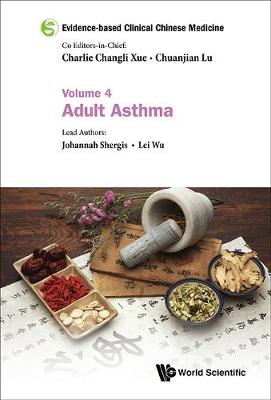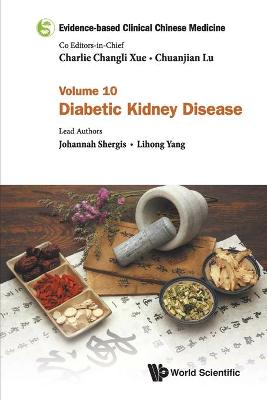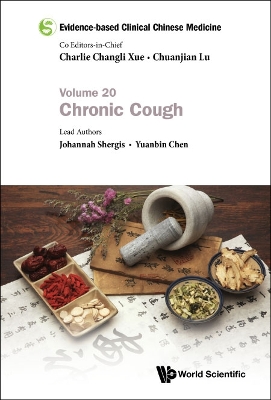Evidence-based Clinical Chinese Medicine
4 primary works
Book 4
Evidence-based Clinical Chinese Medicine - Volume 4: Adult Asthma
by Johannah Shergis and Lei Wu
Published 18 June 2018
Evidence-based Clinical Chinese Medicine: Adult Asthma provides a 'whole evidence' analysis of the Chinese medicine management of adult asthma. Evidence from the classical Chinese medicine literature, contemporary clinical literature, the outcomes of clinical trials and experimental studies are reviewed, analysed and synthesised. The data from all these sources are condensed to provide evidence-based statements which will inform clinical practice and guide future research.This book has been designed to be an easy reference at the point of care. During a patient consultation, Chinese medicine practitioners can refer to this book for guidance on which Chinese herbal medicine formulas, specific herbs, or acupuncture points, can best treat their patient, and be confident there is evidence which supports its use.Currently, Chinese medicine practitioners who develop a special interest in a particular health condition such as adult asthma have to consult a variety of sources to further their knowledge. Typically, they use the contemporary clinical literature to understand the theory, aetiology, pathogenesis and obtain expert opinions on the Chinese medicine management of adult asthma. They search the electronic literature to identify systematic reviews of clinical trials, if any exist, to obtain assessments of the current state of the clinical evidence for particular interventions. If they have the skills and resources, they may search the classical Chinese medicine literature for an historical perspective on treatments that have stood the test of time.This book provides all of this information for practitioners in one handy, easy to use reference. This allows practitioners to focus on their job of providing high quality health care, with the knowledge it is based on the best available evidence.
Book 10
Evidence-based Clinical Chinese Medicine - Volume 10: Diabetic Kidney Disease
by Johannah Shergis and Lihong Yang
Published 3 May 2019
This book presents an in-depth analysis using a 'whole evidence' approach of Chinese medicine treatments for diabetic kidney disease. It is the 10th volume in the Evidence-based Clinical Chinese Medicine series and is an essential reference tool for Chinese medicine practitioners interested in kidney diseases and nephrology.The book provides a comprehensive description of diabetic kidney disease from conventional medicine and Chinese medicine. It includes a summary of Chinese medicine treatments used in classical Chinese medicine books, as well as treatments that have been verified in clinical studies.Written by internationally recognized, well respected leaders in Chinese medicine, this book is ideal for Chinese medicine practitioners and students who want to keep up to date with the latest research to support their clinical practice. Providing summaries of the classical and modern literature in one book gives readers easy access to the evidence that will ensure their clinical practice incorporates an evidence-based approach.Chinese medicine treatments in the book include herbal medicine, acupuncture and combinations of these therapies. Treatment effects are described in terms of progression of disease, change in kidney function, markers of kidney damage, and indicators of risk factor control. Herbal formulas, herb ingredients and acupuncture points are analysed and discussed in relation to treatments described in clinical textbooks and guidelines, clinical trials and those identified in classical literature.
Book 20
Evidence-based Clinical Chinese Medicine - Volume 20: Chronic Cough
by Johannah Shergis and Yuanbin Chen
Published 7 October 2020
Chronic Cough is the 20th volume of the Evidence-based Clinical Chinese Medicine series. It provides a multi-faceted 'whole evidence' analysis of the management of chronic cough, including cough variant asthma, upper airways cough syndrome, and gastroesophageal reflux disease in Chinese medicine. Evidence from the classical Chinese medicine literature, contemporary clinical literature, the outcomes of clinical trials and experimental studies are reviewed, analysed and synthesised. The data from all these sources are condensed to provide evidence-based summaries and identity implications for the clinical practice of Chinese medicine and for future research. This book can inform clinicians and students in the fields of integrative medicine and Chinese medicine regarding contemporary practice and the current evidence base for a range of Chinese medicine therapies used in the management of chronic cough, including herbal formulas and acupuncture treatments, in order to assist clinicians in making evidence-based decisions in patient care.Currently, Chinese medicine practitioners who develop a special interest in a particular health condition, such as chronic cough need to consult a diversity of resources to expand their knowledge. Such sources typically included specialty books and journal articles sourced from biomedical databases published in Chinese and English. However, not all practitioners have access to such sources to obtain information on the evidence-based management of chronic cough. By providing all this information in one handy, easy to use reference, this book allows practitioners to focus on providing high quality health care, with the knowledge it is based on the best available evidence.
Book 27
Evidence-based Clinical Chinese Medicine - Volume 27: Overweight And Obesity In Adults
by Johannah Shergis and Jiaxin Chen
Published 29 October 2022
The 27th volume of the Evidence-based Clinical Chinese Medicine series examines the management of people who are overweight and obese with Chinese medicine using a 'whole evidence' approach. Overweight and obesity are recognised as leading health concerns worldwide. They have significant impacts on quality of life and mortality and are associated with many complications and chronic illnesses, including diabetes mellitus, cardiovascular disease, hypertension, stroke and some cancers. Conventional medicine understanding of weight gain, including common causes, diagnosis and treatment are included, along with the Chinese medicine conceptualisation of overweight and obesity.Evidence from clinical studies is reviewed using internationally accepted scientific methods. Systematic reviews describe the treatments used in clinical studies, and analyse the effectiveness of Chinese herbal medicines, acupuncture and related therapies, other Chinese medicine therapies, and combinations of Chinese medicine therapies. Experimental studies that describe the potential mechanisms of action of key herbs are summarised. The final chapter synthesises the current evidence and offers suggestions for contemporary clinical practice and future research.This book is a handy desktop reference for both clinicians and students of Chinese and integrative medicine. It provides a comprehensive synthesis of both traditional and contemporary knowledge that can inform clinical decision-making.



